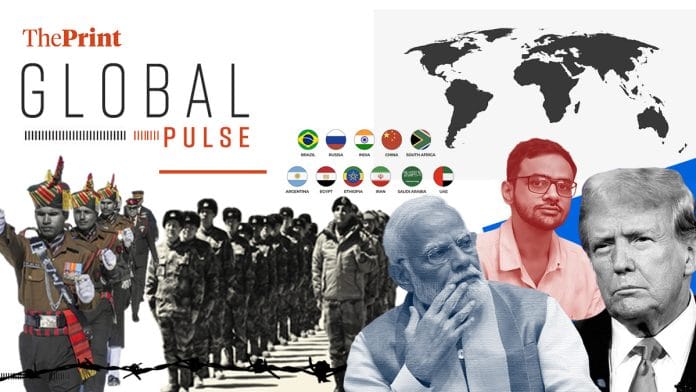New Delhi: Strongman leaders of the world prefer a Donald Trump presidency over a Kamala Harris presidency in the United States, writes the Financial Times chief foreign affairs columnist Gideon Rachman.
Rachman, in his column, writes that the pro-Trump camp includes Israel, Russia, Hungary, Argentina, Saudi Arabia, and India.
After delving into why governments led by Vladimir Putin, Viktor Orban, and Georgia Meloni might feel like they could work better with Trump, Rachman turns his gaze to India.
“Trump’s stress on power politics and his indifference to democracy and human rights worries the EU,”’ he writes. “But it makes him the preferred partner for Benjamin Netanyahu’s Israel, Mohammed bin Salman’s Saudi Arabia and Narendra Modi’s India.”
A good relationship with India is now a bipartisan issue in the US, writes Rachman. Several important agreements were signed between India and the Biden administration, Rachman writes, adding that Modi and the BJP, however, see the Democrats as “too inclined to pressure them on minority rights and the protection of democracy”.
The point of tension between the two countries arose recently. A common refrain in India, Rachman writes, is that US liberals interfered in Bangladesh to bring about a “regime change” and that a distinctly anti-India government could form in the neighbouring country.
Moreover, “as a fellow strongman leader and ethno-nationalist, Modi would feel more comfortable with Trump than Harris, despite her familial links to India”, Rachman concludes.
As for the rest of the world, Rachman writes, a Harris administration would be “stable and predictable”, whereas Trump represents “wildness and volatility”.
Let the chips fall where they may.
The New York Times points to one of a case in India, which, if criticised, might make the government bristle — the incarceration of Umar Khalid. In a report on Khalid, who has now spent 1,500 days in prison without trial, the NYT writes that he is a “symbol of the wide-ranging suppression of dissent” in Modi’s India.
“Mr. Modi’s government has worked to bend the judicial system to its will and wield it as a weapon against a range of adversaries,” the report says. “When the dissenting voice is Muslim, as in Mr. Khalid’s case, the hammer brandished by the Hindu-nationalist government comes down even harder, activists and family members say.”
For his family and friends, the process is very much the punishment. The report details their “cruel routine” as they constantly go to court to secure Khalid at least a bail hearing. Khalid’s rise to prominence as an activist plays out in parallel to the emboldening of Hindu nationalism under Modi, and the report details how events such as the CAA and Shaheen Bagh protests left a massive political imprint on the Indian public.
“He became more vocal after Mr. Modi’s rise to national power, which injected deeper violence into the existing anti-Muslim prejudice,” the report says about Khalid.
Other global coverage of India revolves around its Line of Actual Control (LAC) deal with China on Monday. The Washington Post, reporting on the India-China agreement on patrolling along the LAC, says the Chinese and Indian officials have been signalling the possibility of restoring ties for months.
The US will be watching closely, The Post reports. It quotes Harsh Shringla, a former foreign secretary and ambassador to the US, as saying that even if India repairs ties with China, “its relationship with the United States runs deeper”.
“There will always be issues with us and a neighbour like China. It won’t be a free-flowing relationship,” The Post quotes Shringla as saying.
On Tuesday, China’s foreign ministry confirmed the agreement over border resolution ahead of the BRICS summit.
While Global Times, so far, has not weighed in on the LAC deal, it has published a report about the summit.
“This year marks the beginning of greater BRICS cooperation,” the Global Times says, drawing attention to the first summit since the group’s expansion in 2023 to include six newcomers — Argentina, Egypt, Ethiopia, Iran, Saudi Arabia, and the United Arab Emirates (UAE).
Economic and financial cooperation will be the main theme of the summit, Global Times reports, quoting the Chinese Ambassador to Russia. “As the overall strength of Global South countries continues to grow and their share in the global economy keeps increasing, there is an urgent need to promote reforms in the international financial and monetary system,” the report states.
The summit will play a “pivotal role in global governance”, the report adds. “By completing their ambitious development agenda, the BRICS nations will demonstrate the efficacy of South-South cooperation in driving sustainable development.”
The South China Morning Post, however, reports on the LAC deal, its headline describing it as “sparking hope of better ties”.
On the heels of the LAC deal, Modi is expected to meet Xi Jinping in Russia during the BRICS summit, it points out.
“But when asked whether the leaders would hold bilateral talks on the sidelines of the BRICS summit, (Indian foreign secretary) Misri said the possibility was still being discussed,” the report reminds readers.
Another SCMP report chronicles the American response to the thaw in the India-China border tension — a US State Department spokesperson said that Washington is closely following the developments.
“The department did not say if New Delhi had informed Washington—a key geopolitical partner—about the agreement, which Beijing also has yet to confirm,” it states at the outset.
India’s grown closer to the US over the last few years, with both countries seeing Beijing as “aggressive”, the report adds.
“However, scepticism has emerged in Washington regarding New Delhi’s growing closeness to the Kremlin, particularly amid pressure to isolate Putin from the West following Russia’s invasion of Ukraine,” it continues, describing Moscow as having friendly relations with both Beijing and New Delhi.
(Edited by Madhurita Goswami)
Also Read: Global media on 2 denials, one by expelled Indian envoy to Canada & one by Trudeau






